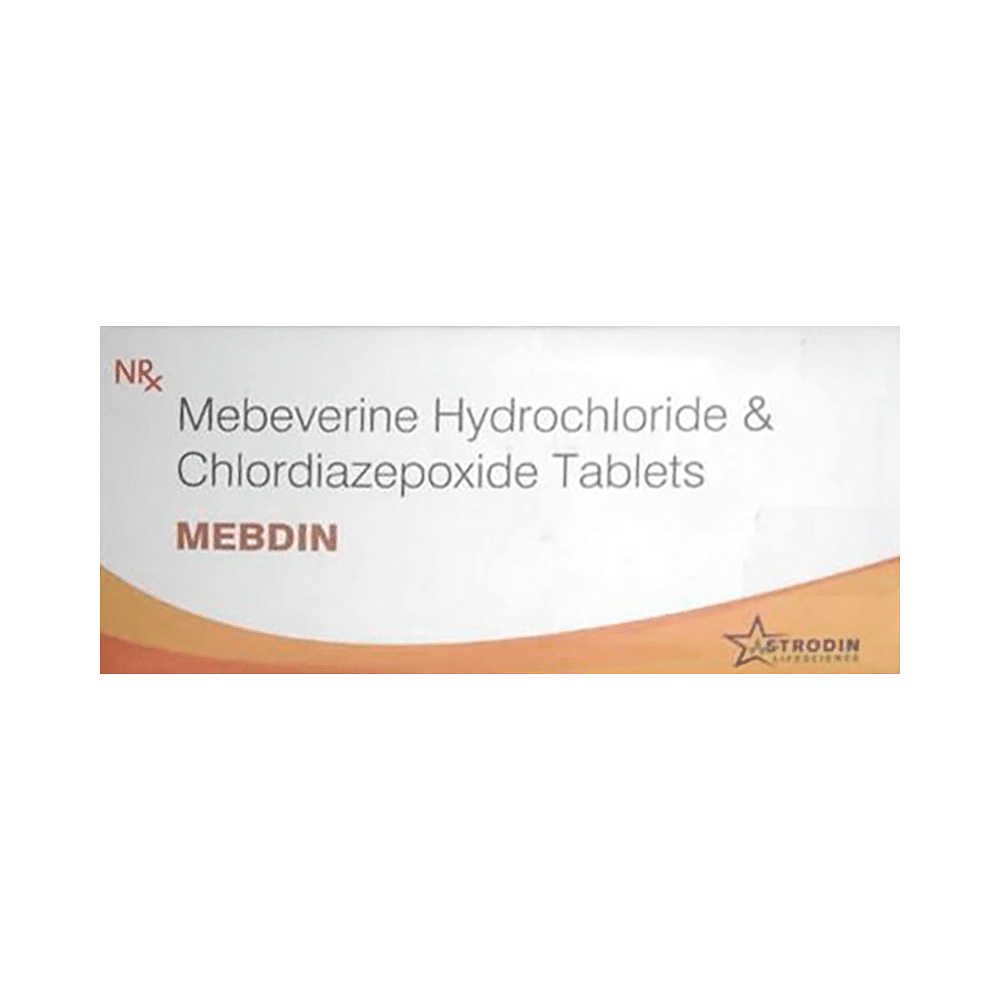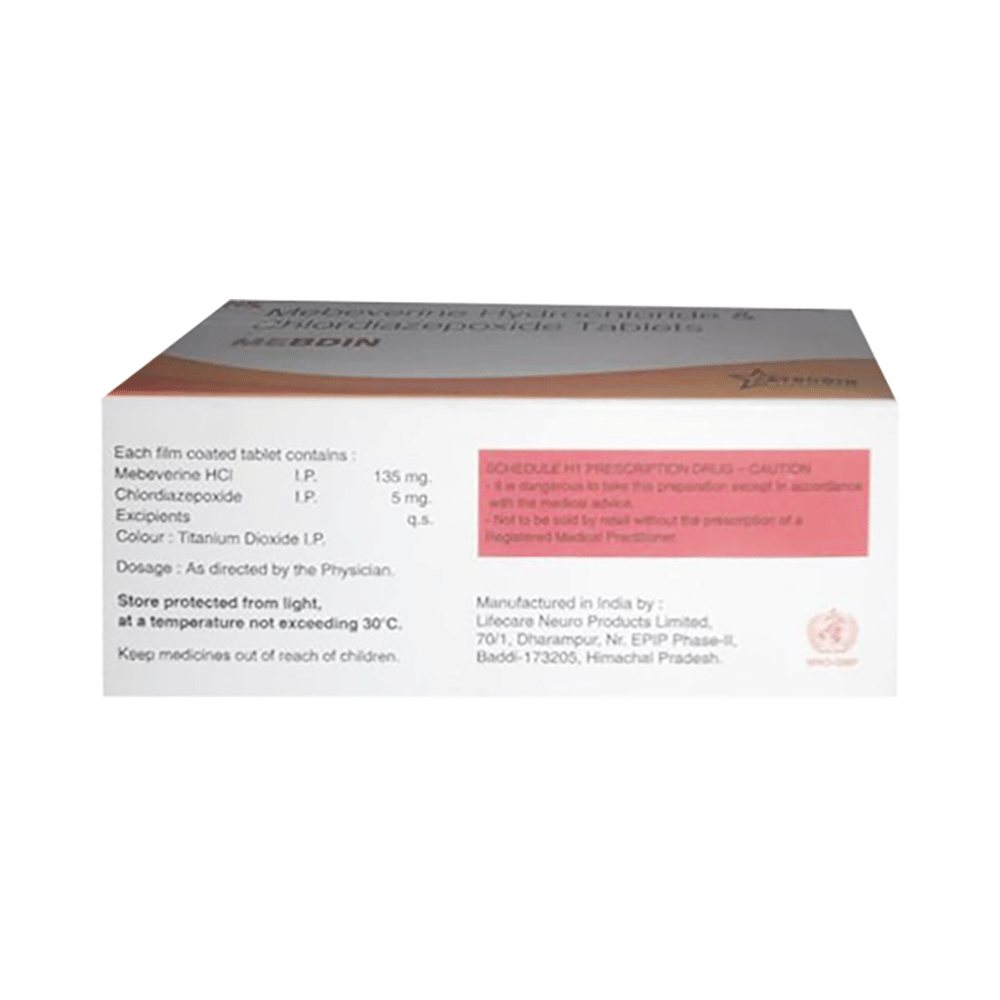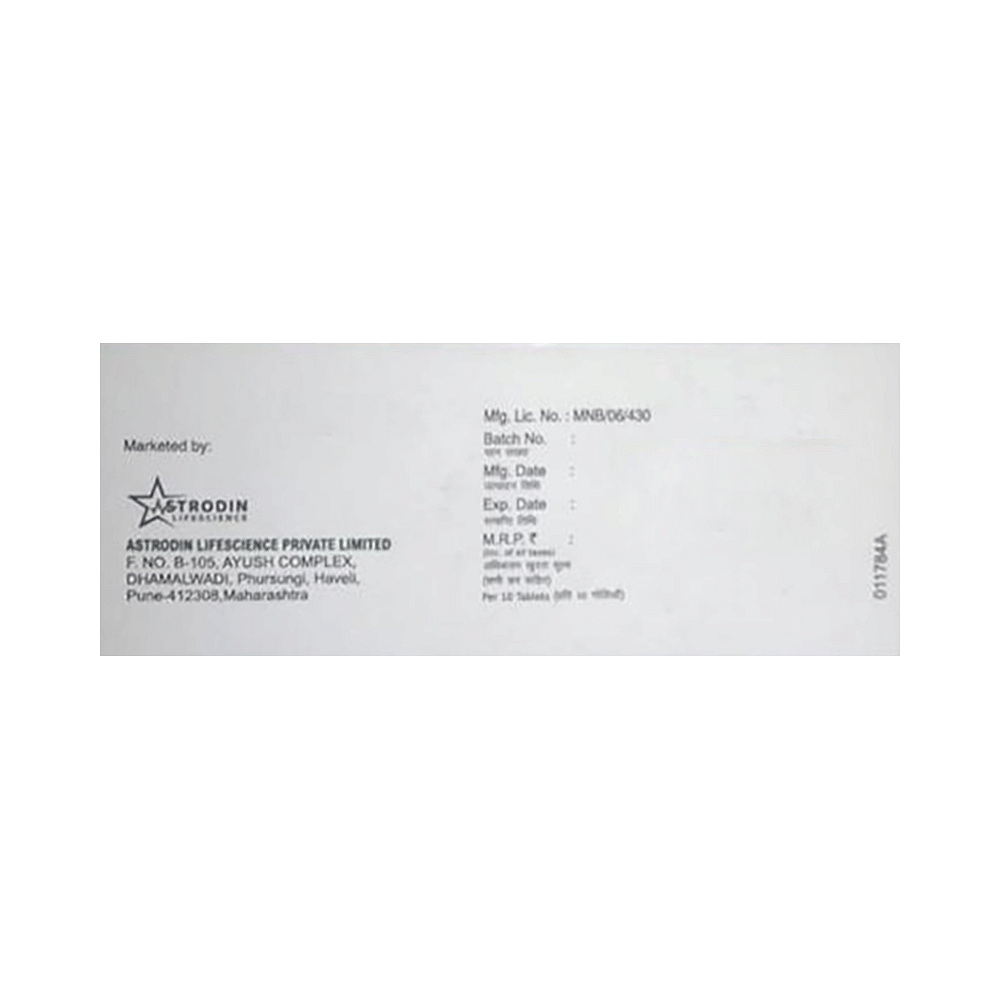


Mebdin Tablet
Manufacturer
Astrodin Life Science Pvt Ltd
Salt Composition
Mebeverine (135mg) + Chlordiazepoxide (5mg)
Key Information
Short Description
Mebdin Tablet is used to treat irritable bowel syndrome (symptoms include abdominal pain, cramping, bloating, and diarrhea or constipation).
Dosage Form
Tablet
Introduction
Mebdin Tablet is taken without food in a dose and duration as advised by the doctor. The dose you are given will depend on your condition and how you respond to the medicine. You should keep taking this medicine for as long as your doctor recommends. If you stop treatment too early your symptoms may come back and your condition may worsen. Let your healthcare team know about all other medications you are taking as some may affect or be affected by this medicine. The most common side effects are fatigue, confusion, uncoordinated body movements, skin rash, and slurred speech. Most of these are temporary and usually resolve with time. Contact your doctor straight away if you are at all concerned about any of these side effects. It may also cause dizziness and sleepiness so do not drive or do anything that requires mental focus until you know how this medicine affects you. Avoid drinking alcohol while taking this medicine as it can worsen your sleepiness. Lifestyle modifications like having fiber-rich diet, avoiding foods that trigger your symptoms, increasing fluid intake and regular exercise can help you to get better results. Before taking it, you should tell your doctor if you have any kidney or liver diseases. You should also tell your doctor if you are pregnant, planning pregnancy or breastfeeding.
Directions for Use
Take this medicine in the dose and duration as advised by your doctor. Swallow it as a whole. Do not chew, crush or break it. Mebdin Tablet is to be taken empty stomach.
How it works
Mebdin Tablet is a combination of two medicines: Mebeverine and Chlordiazepoxide.
Quick Tips
You have been prescribed Mebdin Tablet for the treatment of pain and other discomfort associated with irritable bowel syndrome. Do not take Mebdin Tablet at least 2 hours before or after taking other medicines as it may interact with other medicines. Inform your doctor if you have an enlarged prostate gland, glaucoma, or trouble passing urine. To lower the chance of feeling dizzy or passing out, rise slowly if you have been sitting or lying down.
Frequently asked questions
What are the risks of suddenly stopping Mebdin Tablet?
Mebdin Tablet may cause withdrawal symptoms if stopped suddenly. Stopping the medication abruptly can lead to seizures, shaking, stomach and muscle cramps, vomiting, and sweating. It is essential to consult with your doctor before discontinuing Mebdin Tablet to minimize the risk of withdrawal symptoms.
Is it safe to consume alcohol while taking Mebdin Tablet?
No, it is recommended to avoid drinking alcohol while taking Mebdin Tablet. Combining the medication with alcohol can increase the risk of side effects such as drowsiness or sleepiness.
Can Mebdin Tablet cause drowsiness or sleepiness?
Yes, Mebdin Tablet may cause drowsiness or sleepiness. To minimize the risk of accidents or injuries, avoid driving, operating heavy machinery, working at heights, or engaging in potentially hazardous activities during the initial stages of treatment. Inform your doctor if you experience episodes of drowsiness or sleepiness while taking this medication.
What precautions should I take while using Mebdin Tablet?
Mebdin Tablet should not be taken with opioid-like substances, as it contains chlordiazepoxide. Combining opioids with chlordiazepoxide can lead to excessive sedation, respiratory depression, and potentially life-threatening complications. Inform your doctor about all the medications you are taking before starting Mebdin Tablet.
How should I store and dispose of Mebdin Tablet?
Store Mebdin Tablet in its original container, tightly closed. Follow the storage instructions provided on the packaging or label. Dispose of any unused medication to prevent accidental consumption by pets, children, or other individuals.
What are the symptoms of an overdose of Mebdin Tablet?
Mebdin Tablet contains both Mebeverine and Chlordiazepoxide, which can exhibit different symptoms of overdose. Chlordiazepoxide may cause sleepiness, reflexes, confusion, and coma, while Mebeverine can cause mild and reversible CNS excitability. If you take a higher dose than prescribed and experience any of these symptoms, inform your doctor immediately.
Can Mebdin Tablet cause constipation?
Yes, Mebdin Tablet may cause constipation. To alleviate this side effect, consume high-fiber foods such as vegetables, fruits, and cereals, and drink plenty of water. Regular exercise, such as swimming, jogging, or walking, can also help. If constipation persists for an extended period, consult your doctor for further guidance.


